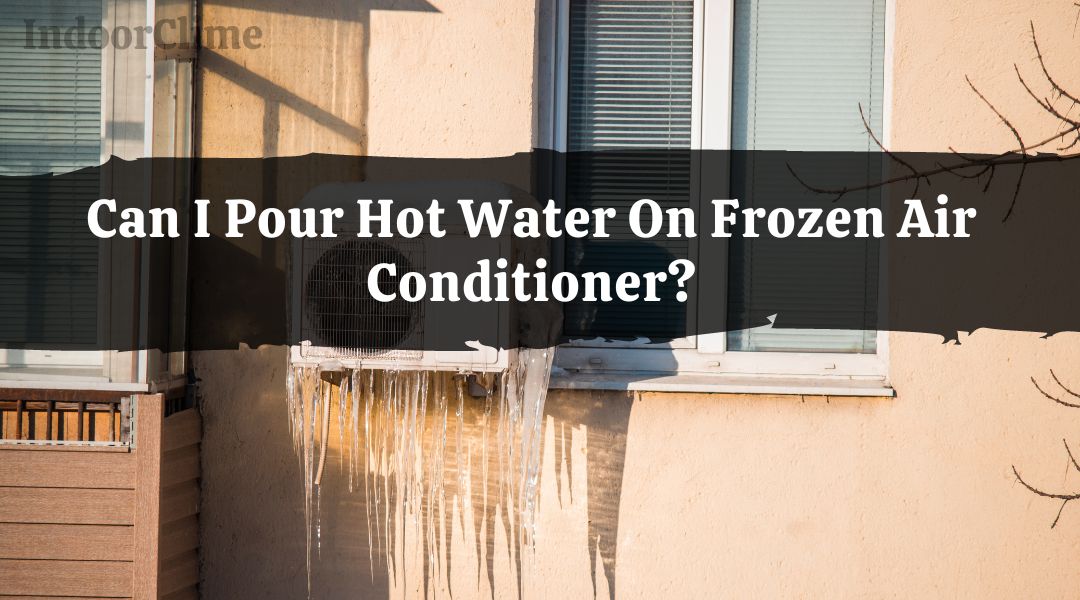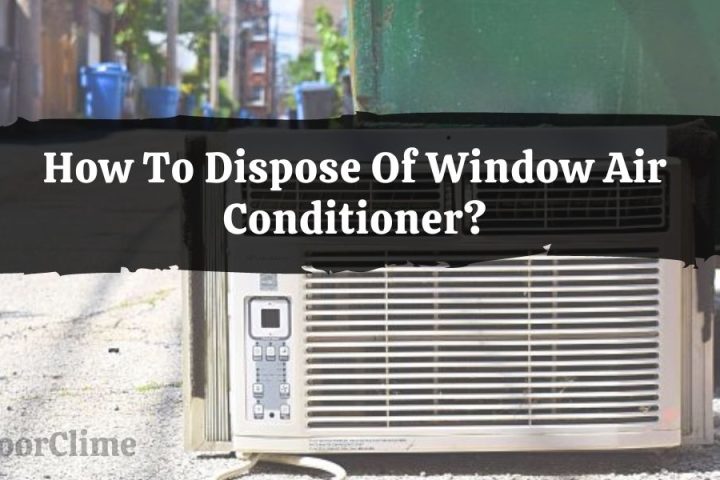An air conditioner is a crucial device depending on the season. Therefore, your air conditioner must do weekly or monthly maintenance to ensure its proper operation.
Due to the abundance of dirt, dust, and other debris, the airflow in the AC’s refrigerant line may become clogged due to a lack of proper care. As a result, the air conditioner freezes.
Let’s discuss whether you can pour hot water on a frozen air conditioner and some cleaning suggestions and approaches.
Yes, you can pour hot water on a frozen air conditioner. Pouring hot water will melt the ice faster, allowing your AC to thaw quicker. In truth, the water does not have to be excessively hot; warm or flowing water will suffice.
Can I Pour Hot Water On Frozen Air Conditioner?
If it becomes frozen, spraying your air conditioner with hot water is entirely safe. However, you can use cold or room-temperature water if you don’t want hot water to clean your AC unit.
If you remove enough debris, grime, and dust, spraying an air conditioner with water can help it work more efficiently. As a result, airflow will be improved, and the system will not overheat.
However, spraying hot water into the AC unit may cause the condenser to overheat. As a result, the heat will begin to rise instead of evaporating.
Spray cold or room temperature water into the AC unit. If the AC unit is not frozen, do not spray hot water on the condenser, as this could injure the condenser and cause it to malfunction.
Other Ways To Defrost Your Air Conditioner

Running your AC unit with a frozen component might damage your system, but you don’t have to wait for an AC technician to come and thaw your freezing A/C unit.
Begin With A Gentle Approach
Allowing nature to melt the ice is the safest approach to defrosting your air conditioner. First, turn your system off from the control panel, then turn off the power to the system at the breaker in your home’s electrical panel.
Then wait for the ice to melt. Don’t use your hands or a sharp tool to pry the ice off. You risk harming the components or, worse, injuring yourself. Depending on the amount of ice, melting could take up to 24 hours.
Apply A Little Heat
If only a small amount of ice has formed on your evaporator coil, you can defrost it swiftly using a hairdryer on the lowest setting.
Maintain a distance of at least 12 inches between the hairdryer and the coil. Too much heat can shatter an evaporator coil, so proceed with caution.
After melting the ice, dry the system out by switching to fan-only mode.
What Does It Mean When Your Air Conditioner Freezes?
A lot of circumstances can cause your air conditioner to freeze. Let’s look at some feasible causes of your air conditioner freezing.
Airflow Obstruction
One of the most frequent causes of your air conditioner being fully frozen is a blockage in the airflow.
When there is a hindrance in the airflow, the evaporator coil becomes blocked with ice; the air conditioner freezes due to the absence of air conductivity.
Refrigerant Discharge
The goal of refrigerant is to collect heat from your room and discharge it through the external zone of the compressor.
As a result, when the refrigerant is discharged prematurely, the refrigerant level begins to shift dramatically, progressively lowering the pressure inside the refrigerant line.
As a result, ice collects within the pipelines, clogging them.
Air Ducts That Are Ripped
Ruptured air ducts likely cause the temperature to drop inside the evaporator coil. Furthermore, ruptured air ducts distort hot air distribution inside the evaporator coil.
As a result, the coils in your air conditioner would freeze.
The Blower Motor’s Disintegration
Failure of the blower motor disrupts the smooth operation of superb air distribution since it cannot control and finish off the hot air in that distinct region.
In addition, because the denser air cannot travel through the blower motor, your AC unit’s overall air circulation system becomes congested, causing the refrigerant line to freeze within.
Dirty Filters
Your air conditioner unit uses filters to clean the air it sends flowing back through your home.
However, if your filters become clogged, the dust and grime can prohibit your machine from functioning properly.
After all, a layer of dirt might obstruct airflow through your unit, contributing to the problem of freezing.
Units For External Air Conditioning
Similarly, an unexpected cold spell in early October may cause your coils to freeze if you have a window unit rather than central air.
You’ll need to check on your unit frequently throughout the fall, winter, and early spring to ensure all systems work correctly.
How Can You Defrost An Air Conditioner?

To keep your home cool, take a few simple measures to defrost your central air conditioner.
Deicing the Equipment
As soon as you observe frost, turn off the air conditioner altogether.
Turn off the power switches on the thermostat and near the condensing unit outside.
To ensure the cooling system does not switch on while you thaw it, go to your fuse box and turn off the breakers that regulate it.
Allow at least 24 hours for the air conditioner to defrost.
Minor frost can melt in hours, but more substantial ice might take up to a day to melt entirely.
So, to be safe, wait at least a day or more to ensure all the ice has melted.
Wipe the AC unit down with a cloth to remove water or moisture.
Examine your air conditioner for accumulated water and condensation. Thoroughly soak any puddles and drips with a dry cloth to eliminate extra moisture.
Restart the air conditioning system.
Re-energize the breakers that control the system at your breaker box.
Next, turn the power switch on near the outdoor condenser unit, turn on the thermostat, and adjust it to the desired temperature.
Frost Prevention
Remove the air conditioner’s filter and clean it.
Turn off your air conditioning system. Next, remove the grille by loosening the fasteners that hold it to the front of the blower unit inside your home.
If there is only a tiny layer of dust on the filter, vacuum it; if there is caked-on filth and grime, rinse it and let it dry.
Clean the coils on your air conditioner.
Turn off the air conditioner. Remove the access panel from the back of the condenser.
To remove dirt and grime from the coils, spray a commercial coil cleaner onto all copper coil tubes, wait the time suggested on the label, and wipe it off with a clean rag.
Check for obstructions in the condensate drain pipe and clear it if necessary.
Check for white PVC or copper tubing near the exterior condenser unit. Examine the condensate drain pipe for any visible things obstructing it, such as leaves or other dirt.
Also, look for pools of water and condensation buildups in the system, as these might be indicators of obstructions.
Call an HVAC specialist to inspect the refrigerant and, if necessary, recharge it.
Low quantities of freon, the coolant used in air conditioners, can cause frost difficulties.
In addition, filling freon can be harmful; therefore, always have a professional handle it and never try to do it yourself.
Set your air conditioner to 78 °F (26 °C).
This is the ideal temperature for your thermostat to be set to. When it’s hot outdoors, it keeps your home cool without being so chilly that it causes the unit to freeze.
Will Frozen AC Fix Itself?
No, a frozen air conditioner will not self-repair. A sequence of procedures must be taken to repair your frozen air conditioner.
Turn off the thermostat on the air conditioner and turn on the fan to thaw the ice. Then, turn on the fan for a few hours to allow the device to defrost thoroughly.
Depending on the weather condition, it could thaw in an hour or take longer.
If you cannot perform the task independently, turn off the compressor and immediately contact an electrician to repair your frozen air conditioner.
How Do You Unfreeze an Air Conditioner Fast?
The quickest way to defrost your air conditioner is to follow these simple steps:
- Turn your frozen air conditioner’s thermostat from COOL to OFF.
- Set the fan to the ON position.
- Examine the filter and, if necessary, replace it.
- If the filter is in good condition (meaning it is not unclean), contact a professional AC cleaner before turning it back on.
How Long Should I Leave My AC Off When Frozen?
Defrosting time for air conditioners ranges between 2 and 24 hours.
Although the precise amount of time cannot be determined, the following considerations can help you estimate how long it will take:
Factors Influencing Defrosting Time
Dimensions of the Unit
The size of your unit determines the length of the defrosting procedure. With low ice development, a smaller unit may take 2 hours.
You might be able to turn off your unit and leave it alone. If this is the case, it should be ready for use in 2-3 hours.
If you have a larger home and a more powerful AC unit, thoroughly thawing your home may take up to a day.
The Amount of Ice Buildup
If you don’t observe any issue with your unit soon, your air conditioning unit will have a more significant ice buildup.
Thawing out if the accumulation is substantial will take a more extended period.
However, if you were fortunate enough to detect the problem soon, you will likely have less ice buildup. This could result in a faster defrosting time.
Temperature Outside
The defrosting times are also affected by the outside temperature. If it’s hotter outdoors, the air conditioner will thaw faster.
On the other hand, it may take longer to defrost if rainy and chilly days. A blow dryer on low heat may be helpful to speed up the procedure on smaller units.
Can I Use a Hair Dryer To Defrost My AC?

You can use a simple hairdryer or a blow dryer, pointing it at the evaporator coils. However, you must avoid using the hairdryer at a higher temperature.
It can harm the internal components of your air conditioning system, causing it to break down or cause other significant problems.





